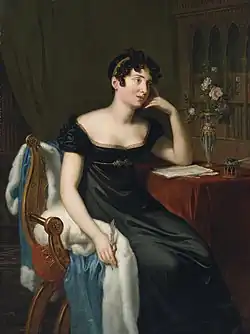Sydney, Lady Morgan

Sydney, Lady Morgan (née Owenson; c. 1778 – 14 April 1859), was an Irish novelist, best known for The Wild Irish Girl (1806), a romantic, and some critics suggest, "proto-feminist", novel with political and patriotic overtones. Her work, including continental travelogues, sparked controversy and faced censorship. She counted Percy Bysshe Shelley and Lord Byron among her defenders.
Quotes
- You see, my good friend, how much we are the creatures of situation and circumstance, and with what pliant servility the mind resigns itself to the impressions of the senses, or the illusions of the imagination.
- The Wild Irish Girl (1806), ep. 5
- Race and temperament go for so much in influencing opinion!
- Diary entry (August 1818); Passages from My Autobiography (1859), p. 17
- Vulgarity is setting store by "the things which are seen."
- Diary entry; Passages from My Autobiography (1859), p. 108
- Architecture is the printing-press of all ages, and gives a history of the state of the society in which it was erected; from the cromlech of the Druids to those toyshops of royal bad taste.
- Diary entry; Passages from My Autobiography (1859), p. 190
- It is quite deplorable to see how many rational creatures (or, at least, who are thought so) mistake suffering for sanctity, and think a sad face and a gloomy habit of mind, propitious offerings to that deity, whose works are all light, and lustre, and harmony, and loveliness.
- The Book of the Boudoir (1829), vol. 2, p. 1
- The playful kitten, with its pretty little tigerish gambles, is infinitely more amusing than half the people one is obliged to live with in the world.
- The Book of the Boudoir (1829), vol. 2, p. 39
- The influence of woman was, is, and ever will be exercised, directly or indirectly, in good or in evil! It is a part of the scheme of nature. Give her then the lights she is capable of receiving; educate her (whatever her station) for taking her part in society. Her ignorance has often made her interference fatal: her knowledge, never.
- The Princess; or, The Béguine (1835), ch. 20
- Your letters are always to me fresher than flowers, without their fading so soon.
- Letter to Lady Combermere (11 April 1859); Memoirs, Autobiographies, Diaries and Correspondence (1862), vol. 2, p. 546
External links
- Caroline H. Dall, The College, the Market, and the Court; or Woman's Relation to Education, Labor, and Law (Boston: Lee and Shepard, 1867), pt. 1, sec. 2, pp. 67, 101
- Maturin M. Ballou (ed.) Notable Thoughts about Women: A Literary Mosaic (Boston: Houghton, Mifflin and Co., 1882), p. 360
- Maturin M. Ballou (ed.) A Treasury of Thought, 13th ed. (Boston: Houghton, Mifflin and Co., 1890), pp. 31, 251, 255, 370, 456
- Charles Noel Douglas (ed.) Forty Thousand Quotations: Prose and Poetical, rev. ed. (New York: George Sully and Co., 1917), pp. 68, 100, 1018, 1262, 1522
- Elaine Partnow (ed.) The Quotable Woman, from Eve to 1799 (New York: Facts On File, 1985), pp. 367–71
- Rosalie Maggio (ed.) The New Beacon Book of Quotations by Women (Boston: Beacon Press, 1996), pp. 41, 282, 298, 393, 406, 429
 Encyclopedic article on Sydney, Lady Morgan on Wikipedia
Encyclopedic article on Sydney, Lady Morgan on Wikipedia